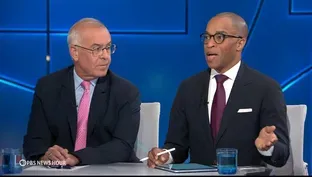
Unpacking Trump's budget proposal and what he wants to cut
Clip: 5/2/2025 | 6m 55sVideo has Closed Captions
Unpacking Trump's budget proposal and where he wants to cut billions in spending
The White House unveiled a budget proposal that would cut billions from non-defense programs across the government. President Trump's $163 billion in spending cuts would hit health, housing, education and climate programs. White House correspondent Laura Barrón-López discussed more with Jessica Reidl of the Manhattan Institute, who was also the chief economist for former GOP Sen. Rob Portman.
Problems with Closed Captions? Closed Captioning Feedback
Problems with Closed Captions? Closed Captioning Feedback
Major corporate funding for the PBS News Hour is provided by BDO, BNSF, Consumer Cellular, American Cruise Lines, and Raymond James. Funding for the PBS NewsHour Weekend is provided by...

Unpacking Trump's budget proposal and what he wants to cut
Clip: 5/2/2025 | 6m 55sVideo has Closed Captions
The White House unveiled a budget proposal that would cut billions from non-defense programs across the government. President Trump's $163 billion in spending cuts would hit health, housing, education and climate programs. White House correspondent Laura Barrón-López discussed more with Jessica Reidl of the Manhattan Institute, who was also the chief economist for former GOP Sen. Rob Portman.
Problems with Closed Captions? Closed Captioning Feedback
How to Watch PBS News Hour
PBS News Hour is available to stream on pbs.org and the free PBS App, available on iPhone, Apple TV, Android TV, Android smartphones, Amazon Fire TV, Amazon Fire Tablet, Roku, Samsung Smart TV, and Vizio.
Providing Support for PBS.org
Learn Moreabout PBS online sponsorshipAMNA NAWAZ: Well, the White House unveiled a budget proposal today that would cut billions from non-defense programs across the government for the next fiscal year.
Our White House correspondent, Laura Barron-Lopez, has more on the president's wish list as part of our coverage this week of the first 100 days of this Trump administration.
LAURA BARRON-LOPEZ: Amna, the president wants to slash $163 billion in federal spending, to be exact.
The dramatic cuts would hit health, housing, education and climate programs.
President Trump, with the help of Elon Musk, has already frozen funding for many of these programs without congressional approval.
Musk's team, known as DOGE, has led the firings of tens of thousands of federal workers, and they have hollowed out nearly a dozen agencies in their efforts to dismantle parts of the federal government.
For more on all of this, I'm joined by Jessica Riedl.
She's a senior fellow at the Manhattan Institute.
She was also chief economist for former Republican Senator Rob Portman.
Jessica, thanks so much for joining us.
JESSICA RIEDL, Senior Fellow, Manhattan Institute: Thank you very much.
LAURA BARRON-LOPEZ: So, first on the news of the day.
Presidential budgets don't have the force of law, so they're often considered a guide to the president's governing philosophy.
Reading through Trump's budget, what do you think is the governing philosophy here?
JESSICA RIEDL: Well, the governing philosophy is ultimately what they call a war on woke.
The word woke appears 12 times.
DEI appears 31 times.
Gender appears 14 times.
Generally, there's a lot of spending cuts that are based on a very exaggerated definition of woke.
The largest cuts that I have seen are the NIH, housing, transportation, United Nations, and international spending.
But, overall, the vision the president is putting out is $163 billion in savings from traditional domestic programs, of which the entire $163 billion would be reprogrammed into increases for defense and Border Patrol.
So there's not really any cuts here.
It's just a movement from domestic programs to border and defense spending.
In fact, it could actually increase deficits, because the budget also reduces funding for IRS enforcement, which will hit the revenue side.
LAURA BARRON-LOPEZ: So, ultimately, can President Trump and Republicans achieve the spending cuts that they're talking about without cutting things like Medicaid?
JESSICA RIEDL: Not really.
The Republican budget envisioned about $1.2 trillion in spending cuts to partially pay for $4.5 trillion in tax cuts.
Well, even those cuts are increasingly unlikely to pass, and they're not going to get any help on the discretionary side, when, again, all the cuts go into new spending on the discretionary side.
Really, I think where a lot of ways this budget matters is not what they can pass through Congress, because most of these spending cuts can't pass Congress.
But it is a signal of perhaps what they're going to try to do outside of Congress, what they're going to try to do through executive order and by DOGE in trying to achieve savings that way.
LAURA BARRON-LOPEZ: I want to ask you about DOGE, because they play a role here.
So, Elon Musk says that he's taking a step back soon from his job inside the White House.
How effective has his team been when it comes to cutting government spending?
JESSICA RIEDL: DOGE has been really effective generating headlines and creating chaos.
But despite promises to save $2 trillion, then downscaled to $1 trillion, then $150 billion, and they claim they have already saved $160 billion, the actual verified savings have been closer to about $5 or $6 billion, which is one-tenth of 1 percent of federal spending.
That's all, because they have really focused on cultural totems, like DEI grants, foreign aid, government employees.
That's not really where the money is.
It creates a lot of excitement among MAGA voters, but they have truly only saved one-tenth of 1 percent of federal spending.
LAURA BARRON-LOPEZ: Right.
They haven't touched defense or other big-ticket items.
And Musk promised some $2 trillion initially worth of cuts to government spending.
And DOGE claims on its Web site that it saved about $160 billion.
But many of these cuts have either been halted by the courts or Republicans are now saying that they may not want to enshrine them into law.
So, if Republicans don't make these cuts law, are they actually legal?
JESSICA RIEDL: Many of them are not legal.
Trying to eliminate many of the programs in USAID, which is a lot of the foreign aid programs, is not legal unless Congress blesses it.
Eliminating the Department of Education is not legal unless Congress blesses it.
What DOGE can do is reallocate spending across different programs.
They can move money from one grant to another, but it is not legal or constitutional for DOGE to unilaterally eliminate entire government programs or agencies that were created by Congress and signed into law.
Unless Congress passes new legislation removing that spending, the courts are going to order it reopened as an illegal termination known as an impoundment.
LAURA BARRON-LOPEZ: So, some of those cuts could end up being reversed?
JESSICA RIEDL: Absolutely.
In fact, I would expect a healthy dose of these cuts to be reversed by the courts, unless Congress passes what's called a rescission bill to cancel spending that's already been enacted.
LAURA BARRON-LOPEZ: One of the other things Elon Musk has claimed repeatedly is that he's rooting out fraud.
In your analysis of their wall of receipts, have you seen any fraudulent programs that are being cut?
JESSICA RIEDL: I have not seen examples of fraud.
In fact, the wall of receipts has mostly consisted of mathematical and accounting errors.
There was things like mistaking an $8 million cut for an $8 billion cut, triple-counting the same savings, counting the termination of a grant from 20 years ago as new savings.
There's a lot of ideological decisions to cancel contracts, but true fraud, the kind of thing that would lead to indictments or people being arrested, DOGE really hasn't uncovered it.
LAURA BARRON-LOPEZ: Jessica Riedl, conservative economist with the Manhattan Institute, thank you for your time.
JESSICA RIEDL: Thank you.
Brooks and Capehart on reaction to Trump's first 100 days
Video has Closed Captions
Clip: 5/2/2025 | 10m 46s | Brooks and Capehart on what voters think about Trump's first 100 days (10m 46s)
Conservative perspective on Trump's authority over history
Video has Closed Captions
Clip: 5/2/2025 | 6m 26s | Conservative offers perspective on Trump's effort to exert authority over history and art (6m 26s)
Jobs market defies expectations amid tariff fears
Video has Closed Captions
Clip: 5/2/2025 | 4m 51s | Jobs market defies expectations amid fears tariffs could soon spur economic downturn (4m 51s)
A look at Trump's order targeting public media funding
Video has Closed Captions
Clip: 5/2/2025 | 5m 56s | A look at Trump's executive order targeting public media funding (5m 56s)
News Wrap: Army plans anniversary parade on Trump's birthday
Video has Closed Captions
Clip: 5/2/2025 | 6m 53s | News Wrap: Army plans 250th anniversary parade on Trump's birthday (6m 53s)
Yemeni diplomat asks U.S. for more support fighting Houthis
Video has Closed Captions
Clip: 5/2/2025 | 9m 33s | Top Yemeni official visits Washington seeking more U.S. support in fighting Houthis (9m 33s)
Providing Support for PBS.org
Learn Moreabout PBS online sponsorshipSupport for PBS provided by:
Major corporate funding for the PBS News Hour is provided by BDO, BNSF, Consumer Cellular, American Cruise Lines, and Raymond James. Funding for the PBS NewsHour Weekend is provided by...

















